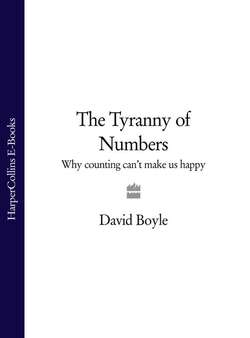Читать книгу The Tyranny of Numbers: Why Counting Can’t Make Us Happy - David Boyle - Страница 25
Counting paradox 3: Numbers replace trust, but make measuring even more untrustworthy
ОглавлениеWhen farmers and merchants didn’t trust each other to provide the right amount of wheat, they used the standard local barrel stuck to the wall of the town hall, which would measure the agreed local bushel. When we don’t trust our corporations, politicians or professionals now, we send in the auditors – and we break down people’s jobs into measurable units so that we can see what they are doing and check it. If doctors hide behind their professional masks, then we measure the number of deaths per number of patients, their treatment record and their success rate, and we hold them accountable. When politicians look out of control, we measure their voting records and their popularity ratings – just as the TV commentators break down a sporting performance into opportunities, misses, aces, broken services and much else besides.
It wasn’t always like that. Previous generations realized that we lose some information every time we do this – information the numbers can’t provide. They realized, like James Anyon, that we could never measure what a doctor does so well that we could do it for them. They still have experience that slips through the measurement, so we still have to accept the word of the professionals to get to the truth. The British establishment used to be quite happy to accept the word of the professionals if they were ‘trustworthy gentlemen of good character’. But from the outside, that trust looked like a cosy nepotistic conspiracy. And probably it was.
It was this kind of political problem which led to the growth of cost-benefit analysis. This was originally used by French officials to work out what tolls to charge for new bridges or railways, but it was taken up with a vengeance in twentieth-century America as a way of deciding which flood control measures to build. After their Flood Control Act of 1936, there would be no more federal money for expensive flood control measures unless the benefits outweighed the costs. Only then would the public be able to see clearly that there was no favouritism for some farmers rather than others. It was all going to be clear, objective, nonpolitical and based on counting.
Even so, the professionals clung to their mystery as long as they could, just as doctors fought the idea of scientific instruments that would make the measurements public and might lead people to question their diagnoses – the stethoscope was acceptable because they were the only ones who could listen to it. Even the US Army Corps of Engineers – in charge of the flood control analysis – tried to keep the mystery alive. ‘It is calculated according to rather a complex formula,’ a Corps official told a Senate committee in 1954. ‘I won’t worry you with the details of that formula.’ It couldn’t last. The more they were faced with angry questioning, the more their calculations had to be public.
But how far do you go? Do you, as they did for some flood control schemes, work out how many seagulls would live in the new reservoir, and how many grasshoppers they would eat, and what the grain was worth which the grasshoppers would have eaten? Do you work out what these values might be in future years? Do you value property when no two estate agents can name the same price? ‘I would not say it was a guess,’ one of their officials told the US Senate about property values. ‘It is an estimate.’ And after all that, it is economists who persuaded the US Secretary of the Interior, Bruce Babbitt, to start demolishing the dams their predecessors laboriously calculated.
So here’s the paradox. Numbers are democratic. We use them to peer into the mysterious worlds of professionals, to take back some kind of control. They are the tools of opposition to arrogant rulers. Yet in another sense they are not democratic at all. Politicians like to pretend that numbers take the decisions out of their hands. ‘Listen to the scientists,’ they say about BSE or genetically-modified food. ‘It’s not us taking the decisions, it’s the facts.’ We are submitting these delicate problems to the men in white coats who will apply general rules about individual peculiarities. It is, in other words, a shift from one kind of professional to another, in the name of democracy – from teachers and doctors to accountants, auditors and number-crunchers. And they have their own secretive rituals that exclude outsiders like a computer instruction manual.
But when it comes to auditing the rest of us in our ordinary jobs, auditing undermines as much trust as it creates – because people have to defend themselves against the auditors. Their lives – usually their working lives – are at stake, and their managers will wonder later why the figures they spent so much to collect are so bizarrely inaccurate. And as we all trust the companies and institutions less, we trust the auditors less too.
